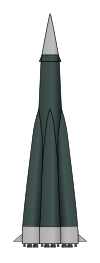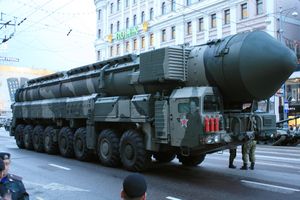صاروخ باليستي عابر للقارات

الصاروخ الباليستي العابر للقارات intercontinental ballistic missile (ICBM)، هو صاروخ باليستي طويل المدى (أكثر من 5,500 كم أو 3,500 ميل) صُمم لنقل لنقل أسلحة نووية ويمكنه نقل واحد أو أكثر من الرؤوس النووية.
وتختلف الصواريخ العابرة للقارات بمداها الأكبر عن باقي الصواريخ متوسطة المدى وصغيرة المدى، وتوجد هذه الصوايخ في روسيا،الولايات المتحدة، الصين والهند وكوريا الشمالية التي تقوم مؤخراً بتطوير الصواريخ بعيدة المدى بعد نجاحها في تجربة الصواريخ قصيرة المدى. بعض الأجهزة الاستخباراتية تشك في قيام كوريا الشمالية بتطوير مثل هذه الصواريخ. في عام 1991م اتفقت كل من الولايات المتحدة الأمريكية وروسيا على تقليل نسبة الصواريخ عابرة القارات لدى كل منهماوالصاروخ له محركان الأول الانطلاقه من اليابسة والثاني عند نزول الصاروخ فيصبح أكثر فعالية مع الجاذبية فيصيب دمارا أكثر.
التاريخ
الحرب العالمية الثانية
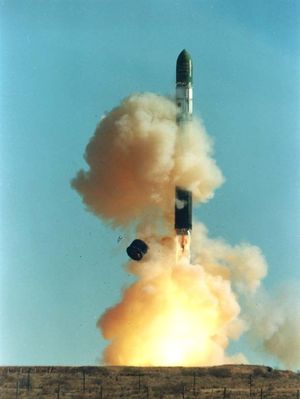
الحرب الباردة


بعد الحرب الباردة
مراحل الإقلاع
مراحل إقلاع الصاروخ الباليستي:
- boost phase: 3 to 5 minutes (shorter for a solid rocket than for a liquid-propellant rocket); altitude at the end of this phase is typically 150 to 400 km depending on the trajectory chosen, typical burnout speed is 7 km/s, up to the speed of Low Earth Orbit.
- midcourse phase: approx. 25 minutes—sub-orbital spaceflight in an elliptic flightpath; the flightpath is part of an ellipse with a vertical major axis; the apogee (halfway through the midcourse phase) is at an altitude of approximately 1,200 km; the semi-major axis is between 3,186 km and 6,372 km; the projection of the flightpath on the Earth's surface is close to a great circle, slightly displaced due to earth rotation during the time of flight; the missile may release several independent warheads, and penetration aids such as metallic-coated balloons, aluminum chaff, and full-scale warhead decoys.
- reentry phase (starting at an altitude of 100 km): 2 minutes – impact is at a speed of up to 4 km/s (for early ICBMs less than 1 km/s); see also maneuverable reentry vehicle.
الصواريخ المعاصرة
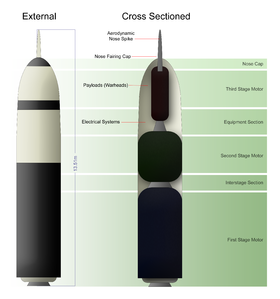
ICBMs can be deployed from multiple platforms:
صواريخ متخصصة
صواريخ تطلق من الأرض
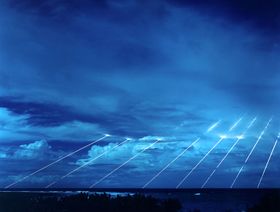
صواريخ تطلق من غواصمات
انظر أيضاً

- Air Force Space Command
- Anti-ballistic missile
- Anti-Ballistic Missile Treaty
- Atmospheric reentry
- Countermeasure
- Dense Pack
- Fractional Orbital Bombardment System
- فرنسا وأسلحة الدمار الشامل
- General Bernard Adolph Schriever
- Heavy ICBM
- High-alert nuclear weapon
- الصين وأسلحة الدمار الشامل
- الهند وأسلحة الدمار الشامل
- إسرائيل وأسلحة الدمار الشامل
- پاكستان وأسلحة الدمار الشامل
- List of ICBMs
- وكالة الدفاع الصاروخي
- نزع السلاح النووي
- بحرية نووية
- حرب نووية
- سلاح نووي
- روسيا وأسلحة الدمار الشامل
- SLBM
- Strike Force (France)
- غواصة
- Throw-weight
- المملكة المتحدة وأسلحة الدمار الشامل
- الولايات المتحدة وأسلحة الدمار الشامل
المصادر
وصلات خارجية
- Ballistic missile characters[dead link]
- Estimated Strategic Nuclear Weapons Inventories (September 2004)
- Intercontinental Ballistic and Cruise Missiles
- "A Tale of Two Airplanes" by Kingdon R. "King" Hawes, Lt Col, USAF (Ret.)

